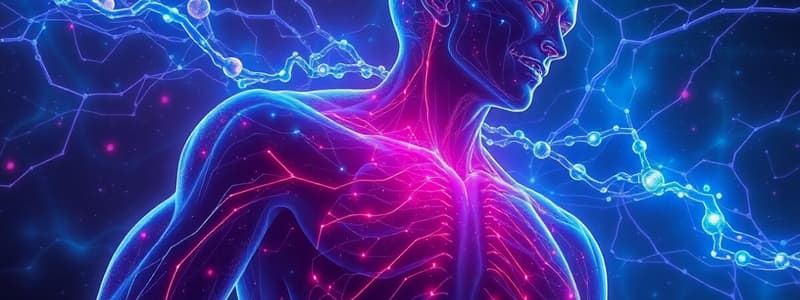Podcast
Questions and Answers
What is the name of the autoimmune disorder discussed in the text?
What is the name of the autoimmune disorder discussed in the text?
Myasthenia Gravis
What is the name of the drug discussed in the text that acts as an acetylcholinesterase inhibitor?
What is the name of the drug discussed in the text that acts as an acetylcholinesterase inhibitor?
Pyridostigmine
How does Pyridostigmine work?
How does Pyridostigmine work?
Which of the following is NOT a side effect/adverse reaction of Pyridostigmine?
Which of the following is NOT a side effect/adverse reaction of Pyridostigmine?
Signup and view all the answers
Which of the following is a contraindication for the use of Pyridostigmine?
Which of the following is a contraindication for the use of Pyridostigmine?
Signup and view all the answers
When is it best to administer Pyridostigmine?
When is it best to administer Pyridostigmine?
Signup and view all the answers
Which of the following is an important nursing intervention for patients taking Pyridostigmine?
Which of the following is an important nursing intervention for patients taking Pyridostigmine?
Signup and view all the answers
What is a crucial piece of client teaching for those taking Pyridostigmine?
What is a crucial piece of client teaching for those taking Pyridostigmine?
Signup and view all the answers
Pyridostigmine is effective in curing Myasthenia Gravis.
Pyridostigmine is effective in curing Myasthenia Gravis.
Signup and view all the answers
Which of the following is a common side effect of Pyridostigmine?
Which of the following is a common side effect of Pyridostigmine?
Signup and view all the answers
What is the primary function of acetylcholine in the context of neuromuscular junctions?
What is the primary function of acetylcholine in the context of neuromuscular junctions?
Signup and view all the answers
What are the potential consequences of a lack of acetylcholine at the neuromuscular junctions?
What are the potential consequences of a lack of acetylcholine at the neuromuscular junctions?
Signup and view all the answers
Myasthenia Gravis is a condition that primarily affects skeletal muscles, making it difficult for individuals to move their limbs.
Myasthenia Gravis is a condition that primarily affects skeletal muscles, making it difficult for individuals to move their limbs.
Signup and view all the answers
What are the main ways in which Pyridostigmine helps to manage Myasthenia Gravis?
What are the main ways in which Pyridostigmine helps to manage Myasthenia Gravis?
Signup and view all the answers
What are some of the key nursing interventions when monitoring a patient on Pyridostigmine?
What are some of the key nursing interventions when monitoring a patient on Pyridostigmine?
Signup and view all the answers
Pyridostigmine can be safely administered with other drugs that decrease heart rate or blood pressure.
Pyridostigmine can be safely administered with other drugs that decrease heart rate or blood pressure.
Signup and view all the answers
What are the possible implications of an overdose of Pyridostigmine?
What are the possible implications of an overdose of Pyridostigmine?
Signup and view all the answers
What are some of the key points of client teaching for patients taking Pyridostigmine?
What are some of the key points of client teaching for patients taking Pyridostigmine?
Signup and view all the answers
What is the expected outcome of a successful Pyridostigmine treatment for Myasthenia Gravis?
What is the expected outcome of a successful Pyridostigmine treatment for Myasthenia Gravis?
Signup and view all the answers
Study Notes
Drugs for Neuromuscular Disorders
Myasthenia Gravis (MG)
- Autoimmune disorder
- Antibodies attack acetylcholine receptor sites, blocking binding and destroying receptors
- Lack of acetylcholine impairs transmission of messages at neuromuscular junctions
- Leads to muscle weakness, especially in respiratory, facial, and extremity muscles
Acetylcholinesterase Inhibitors (Pyridostigmine)
Action
- Improves transmission of messages by inhibiting the destruction of acetylcholine (Ach)
- Allows acetylcholine to move down nerves peripherally
Thinking Points
- Pyridostigmine and peripheral
Use
- Control symptoms of MG
- Increase muscle strength
Side Effects/Adverse Reactions
- Gastrointestinal (GI) disturbances (nausea, vomiting, diarrhea, abdominal cramps)
- Increased salivation, sweating, tearing
- Miosis (constricted pupils), blurred vision
- Bradycardia (slow heart rate)
- Hypertension (high blood pressure)
Contraindications/Precautions
- GI/GU obstruction
- Bradycardia, arrhythmias, hypotension
- Peptic ulcer
- Asthma
Interactions
- Atropine (other anti-cholinergic drugs)
- Other drugs that decrease heart rate or blood pressure
- Best given before meals on an empty stomach
Assessment
- Vital signs
- Medical/medication history
- Obtain baseline symptoms
Nursing Interventions
- Monitor vital signs, including respiratory system
- Monitor for side effects/adverse reactions
- Monitor for decreased muscle strength
- Administer doses on time before meals
- Monitor drug effectiveness
Client Teaching
- Encourage client to wear medical identification
- Take drug as ordered on an empty stomach before meals; do not skip doses
- Report side effects/adverse reactions
- Notify health care provider of any added medications
Evaluation
- Improved muscle strength
- Absence of respiratory distress
- Compliance with medication
Studying That Suits You
Use AI to generate personalized quizzes and flashcards to suit your learning preferences.
Related Documents
Description
This quiz covers the medications used for managing Myasthenia Gravis, focusing on action mechanisms, uses, side effects, and contraindications of Pyridostigmine. Test your knowledge on how these drugs improve muscular transmission and their implications on patient care.


